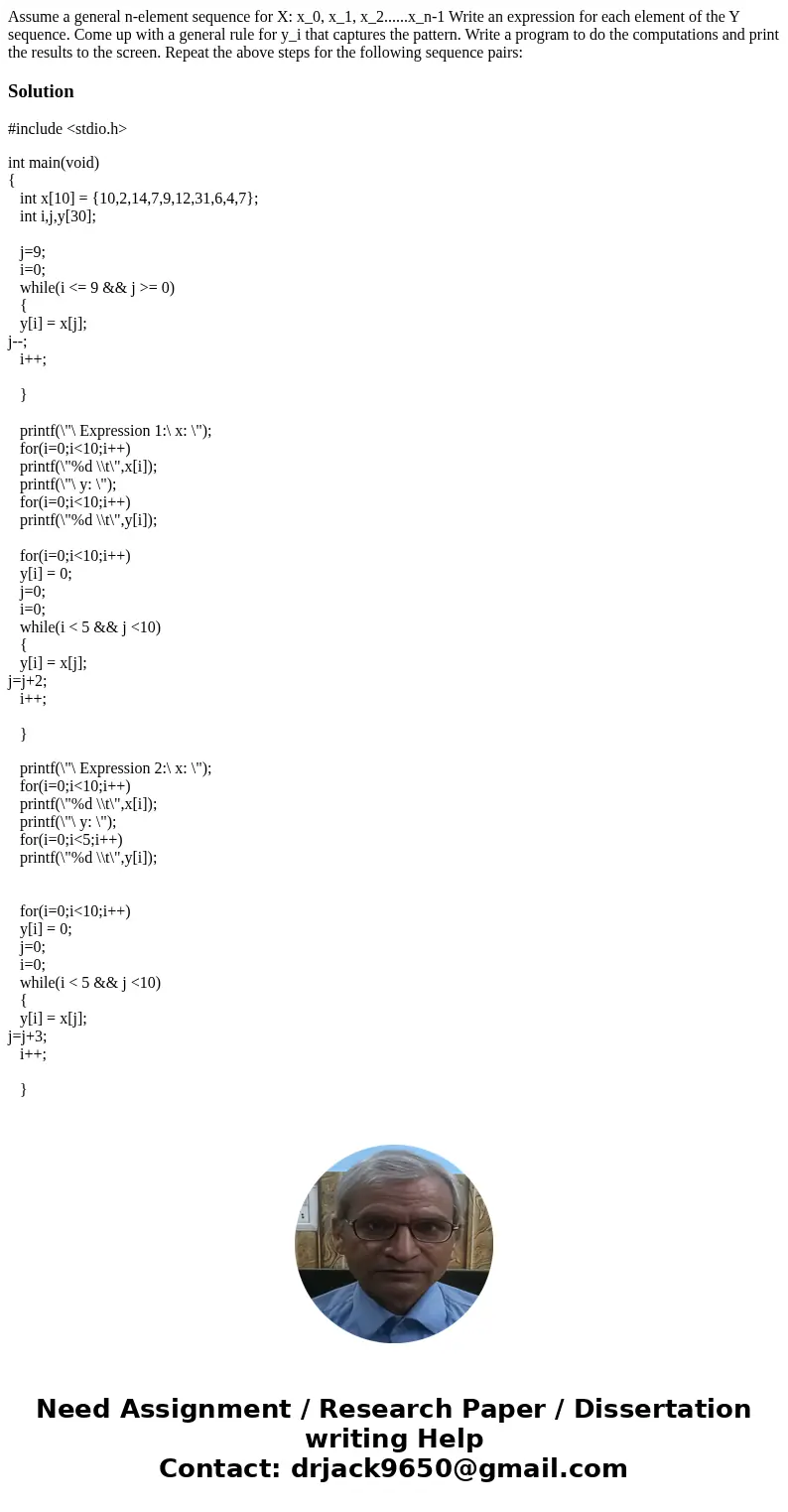Assume a general nelement sequence for X x0 x1 x2xn1 Write a
Solution
#include <stdio.h>
int main(void)
{
int x[10] = {10,2,14,7,9,12,31,6,4,7};
int i,j,y[30];
j=9;
i=0;
while(i <= 9 && j >= 0)
{
y[i] = x[j];
j--;
i++;
}
printf(\"\ Expression 1:\ x: \");
for(i=0;i<10;i++)
printf(\"%d \\t\",x[i]);
printf(\"\ y: \");
for(i=0;i<10;i++)
printf(\"%d \\t\",y[i]);
for(i=0;i<10;i++)
y[i] = 0;
j=0;
i=0;
while(i < 5 && j <10)
{
y[i] = x[j];
j=j+2;
i++;
}
printf(\"\ Expression 2:\ x: \");
for(i=0;i<10;i++)
printf(\"%d \\t\",x[i]);
printf(\"\ y: \");
for(i=0;i<5;i++)
printf(\"%d \\t\",y[i]);
for(i=0;i<10;i++)
y[i] = 0;
j=0;
i=0;
while(i < 5 && j <10)
{
y[i] = x[j];
j=j+3;
i++;
}
printf(\"\ Expression 3:\ x: \");
for(i=0;i<10;i++)
printf(\"%d \\t\",x[i]);
printf(\"\ y: \");
for(i=0;i<4;i++)
printf(\"%d \\t\",y[i]);
for(i=0;i<=10;i++)
y[i] = 0;
j=0;
i=1;
while(i <=10 && j <10)
{
y[i] = x[j];
j++;
i++;
}
printf(\"\ Expression 4:\ x: \");
for(i=0;i<10;i++)
printf(\"%d \\t\",x[i]);
printf(\"\ y: \");
for(i=0;i<=10;i++)
printf(\"%d \\t\",y[i]);
for(i=0;i<=10;i++)
y[i] = 0;
j=0;
i=2;
while(i <=11 && j <10)
{
y[i] = x[j];
j++;
i++;
}
printf(\"\ Expression 5:\ x: \");
for(i=0;i<10;i++)
printf(\"%d \\t\",x[i]);
printf(\"\ y: \");
for(i=0;i<=11;i++)
printf(\"%d \\t\",y[i]);
x[0] = 5;
x[1] = 3;
x[2] = 7;
j=0;
i=0;
while(i <30 && j<3)
{
y[i] = x[j];
i++;
j++;
if(j > 2)
j = 0;
}
printf(\"\ Expression 6:\ x: \");
for(i=0;i<3;i++)
printf(\"%d \\t\",x[i]);
printf(\"\ y: \");
for(i=0;i<30;i++)
printf(\"%d \\t\",y[i]);
x[0] = 10;
x[1] = 2;
x[2] = 14;
x[3] = 7;
x[4] = 9;
x[5] = 12;
x[6] = 31;
i=0;
j=0;
while(i< 7)
{
y[i*2] = x[i];
y[i*2+1] =x[i];
i++;
j++;
}
printf(\"\ Expression 7:\ x: \");
for(i=0;i<7;i++)
printf(\"%d \\t\",x[i]);
printf(\"\ y: \");
for(i=0;i<14;i++)
printf(\"%d \\t\",y[i]);
x[0] = 10;
x[1] = 2;
x[2] = 14;
x[3] = 7;
x[4] = 5;
i=1;
j=0;
y[0] = x[0];
while( i< 6 && j <6)
{
y[i] = x[i] +y[i-1];
i++;
j++;
}
printf(\"\ Expression 8:\ x: \");
for(i=0;i<6;i++)
printf(\"%d \\t\",x[i]);
printf(\"\ y: \");
for(i=0;i<6;i++)
printf(\"%d \\t\",y[i]);
return 0;
}
output:
Success time: 0 memory: 2168 signal:0

 Homework Sourse
Homework Sourse